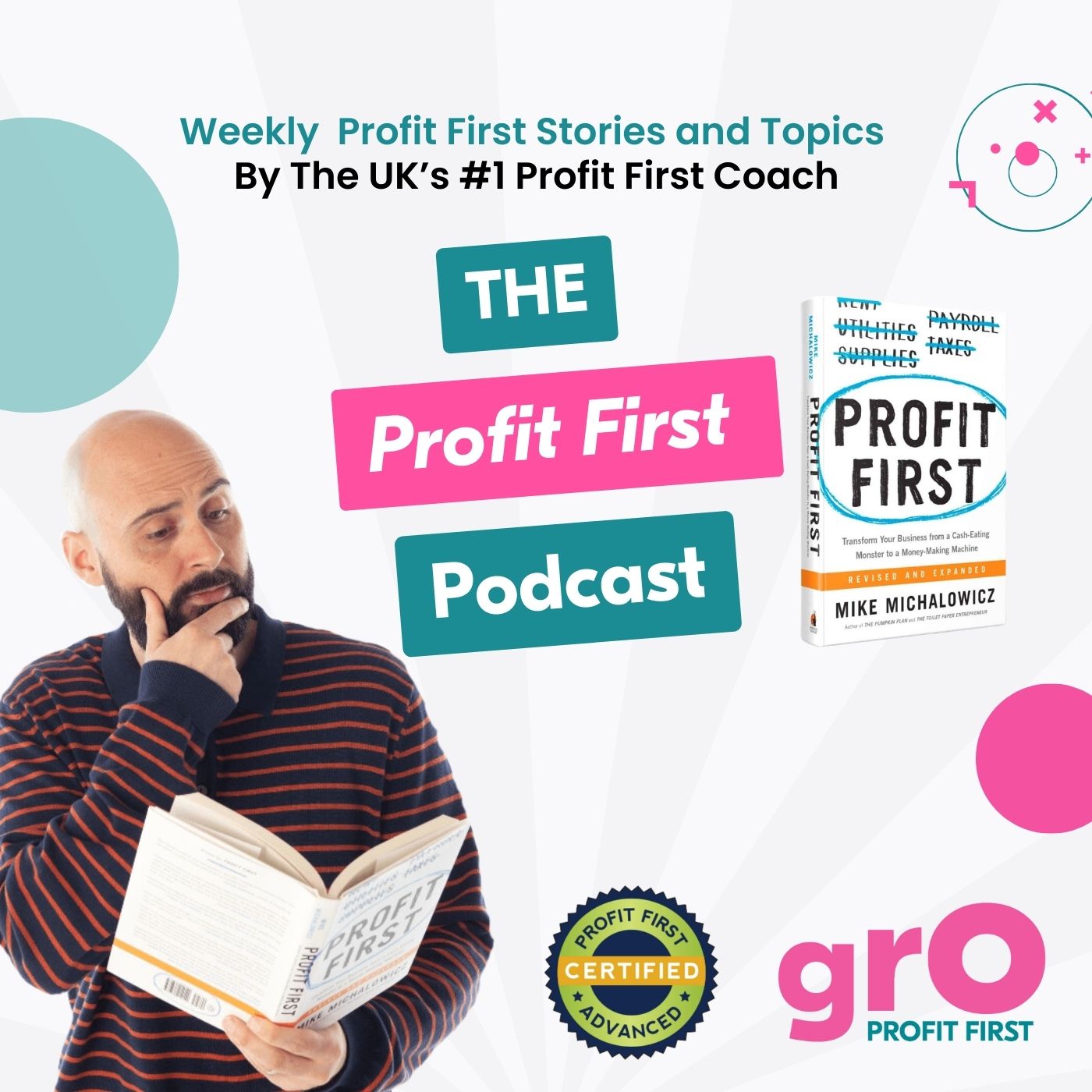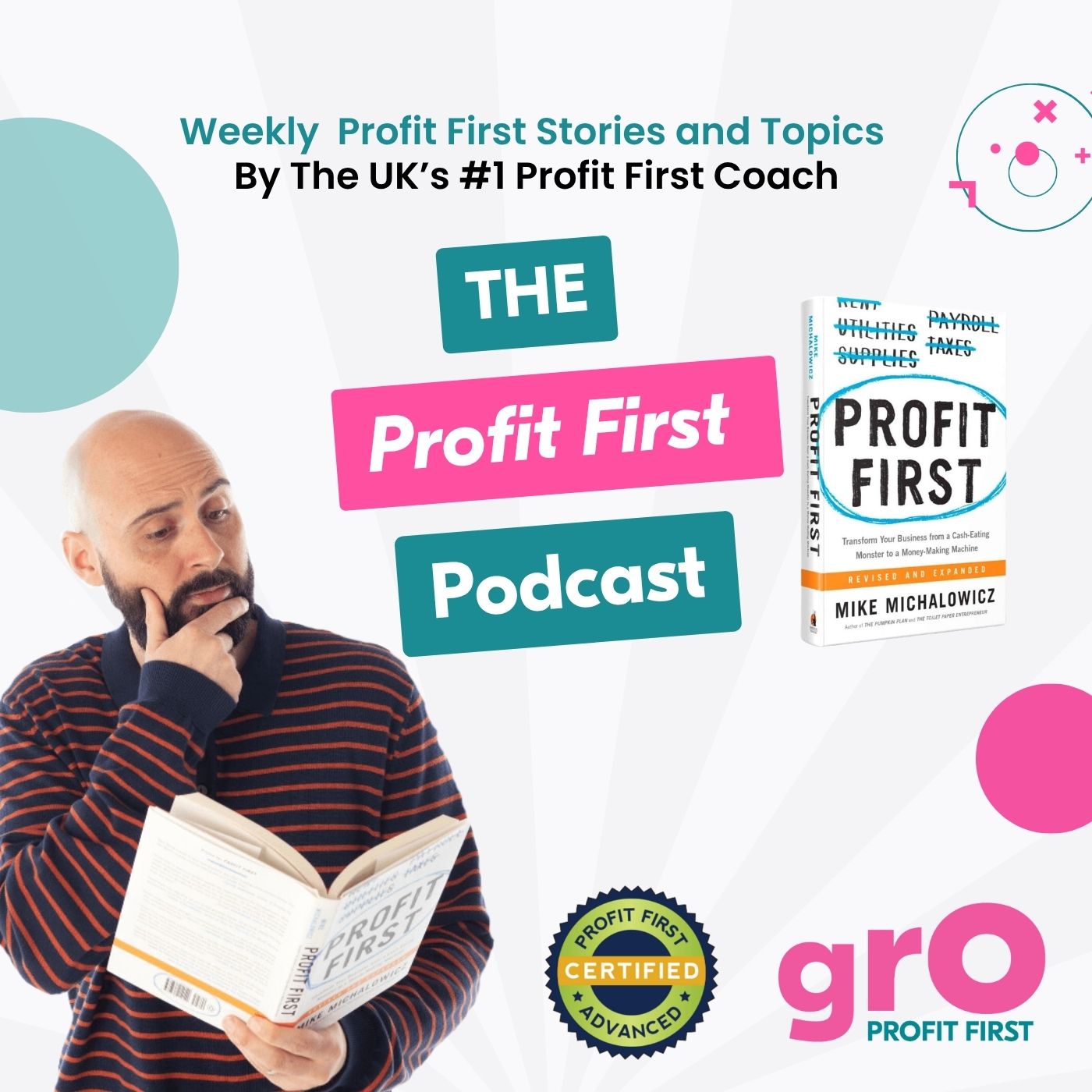Episode Transcript
[00:00:00] Excuses. Here I am. So hi guys, it's Stephen Edwards from the Profit first podcast. So I'm the founder of Grow Profit First Accountants. We're Profit First Accountants here in the UK and we help entrepreneurial minded business owners grow their business profitably and sustainably.
[00:00:22] So on the podcast we talk about all things Profit First. We're huge fans of the system, we're certified in the system, we've worked with dozens and dozens of clients. We implement the system in our own business.
[00:00:37] But if you've been following the podcast for some time, we also talk about how to build a better business in general. And one of the core themes is understanding your numbers. One of the things I've been talking to people about recently, people I've been coaching personally, is having a numbers plan in your business. So in the book I released last year, how to Build a Business that Runs without you, step two of that system is having a numbers plan. And the truth is when we start our business, we don't have much of a numbers plan. The numbers plan probably goes as far as can I pay my mortgage, Can I bring some customers in to pay the bills? And then over time, the business grows, the revenue goes up, the profitability gets pinched, which is the whole point of Profit first and where Profit first comes in. And it really helps set guidelines and benchmarks to make sure you pay yourself what you deserve. However, if we zoom out a little bit more, the main reason for this, and it's actually why Profit first is so good, is people don't have a numbers plan. Whether you're using Profit first or not, whether you've read the book or not, having a plan for your numbers is so important to, to being profitable, to making a business that gives you the life you want. If you just kind of accept any old customer, do any type of job, don't have a plan in terms of when you recruit new team members, you're just kind of going along with it. And that's what we refer to as an amateur business owner. And the truth is we all start as amateur business owners, but over time, as we get more experienced, we kind of become more professional in our thinking. We realize that these grown up managers mature things in terms of understanding your numbers, doing cash flow planning and forecasting and having a budget and having something to aim for, being up to date with your bookkeeper, paying your tax on time. This is what successful business owners do. It doesn't mean you need to be a multi million pound business necessarily.
[00:02:35] You could be, you know, under 100k, you could be a fairly small business. But businesses that successful, they, they have, they, they put these things in place and they understand the numbers. And what I compare it to is building a house or buying an old house.
[00:02:52] You know, we moved into our house in, I believe, about five years ago and it's an older house, it's 1930s, and it's, you know, it's got a lot of things that's happened to it over the years. It's had an extension and then it's had another extension.
[00:03:08] And the truth is we, we love it, it's got a lot of character. But the truth is, if you built our house from scratch, you know, you wouldn't build it the way it is now. And that's the way people's businesses are. If you started your business again, would you have it? Would you create it? Would you have run it the way you run it today? Because the truth is you've probably just fell into the way you run it. Your numbers are your numbers. You get away with what you can charge.
[00:03:31] Your team is your team, your pricing is your pricing. If you were to reinvent your business model from scratch, then how different would it look? And when we talk about having a numbers plan, that's what I'm talking about. I'm talking about knowing, you know, let's say you want to pay yourself £50,000, you want to take out £50,000 from your business into your personal bank account, from your limited company every year. It's no good just saying I want to earn that and not understanding what do the numbers need to look like. You need to understand the numbers. You need to understand what tax am I going to need to set aside to pay myself 50k? What revenue do I need to earn to pay off my cost of sales, to pay my team, to pay my overheads? What do I need to spend in marketing? You need to have some kind of model budget or plan to understand what it's going to look like. And I had a chat with a local business owner recently. We're from the Gloucestershire area, we're based in Cheltenham, although we do serve people throughout the uk as far as, you know, down the London area and as high up as Dundee in, in Scotland.
[00:04:36] And we helped someone understand their margins and we help them drill down to a customer by customer basis. What do the numbers need to look like? Because if you have this overall picture, let's say you're nice round numbers or 100k business, and we're saying that your cost of sales should be no more than 30% that gives you a 70,000 pound gross profit after your goods or after you're paying the team to deliver the service. Let's say you're kind of construction type service and these not meant to be exact, real numbers. I'm just trying to give you an example. Let's say it's 30% for the cost of sales, that gives you a 70,000 pound gross profit.
[00:05:13] So that means that if you need to earn £60,000 before tax to pay yourself 50, you've only got £10,000 left for overheads.
[00:05:23] So that sounds really simple because I want you to understand there needs to be some intention to your business model, to your numbers and obviously that can be a lot more complicated. It can get way more complicated. If you're looking to scale your business over the next few years, you might need to bring in a certain amount of customers and you might need to pay a certain amount per lead in your marketing. You need to drill in and understand those numbers. But the simple premise is what you're looking to pay yourself, what does the revenue need to be, what do the costs need to be? And having a numbers plan is what separates people that achieve their goals, that are successful and people that kind of spin the plates and they're not really going anywhere, they're just not really progressing year and year. And to bring it back to profit first.
[00:06:07] Profit first is one of the best ways of having a numbers plan because there's benchmarks, there's something to work towards. So when we work with people, we help them move closer to their dream number, their life number. What do they need to live the life they want? Yes, we use profit first benchmarking, but we also use industry benchmarking. But we don't limit ourselves to average. We want to be a innovative, resourceful industry leading business and we help people aspire to those sort of numbers. We don't get there overnight. We just look at small improvements on a regular basis to the point where you hardly even notice it. But you're slowly but surely changing your mindset, but having a clarity on what number you're trying to aim for. And even better, knowing why you want that number, why is your life number, your life number is even more powerful still, so hopefully that's useful. Guys, as always, if you've got any questions around profit first, you want to speak to the team, you want to see what it looks like to work with us to put numbers planned together for your business. Feel free to drop me a message or reach out on the website. We've recently changed the URL. It's we are grow grow without a w.co.uk more than happy to have a chat and enjoy the rest of the week. Cheers. Excuses. Here I am so.


